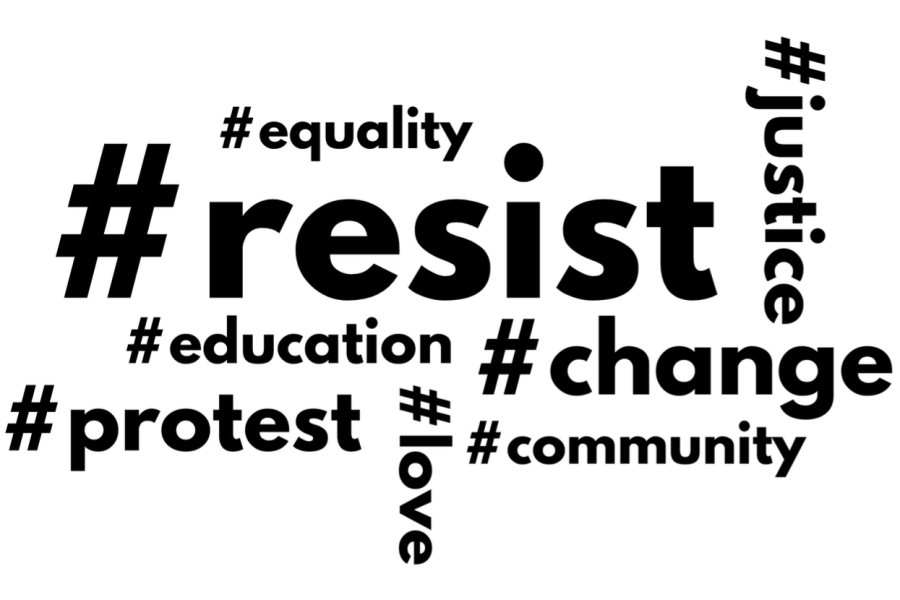Finding rest in resistance
Activists on social media frequently use hashtags to reach more people via algorithms embedded in apps.
Social media is a platform for many different kinds of content. From cooking videos to book recommendations, apps like Instagram, Twitter and TikTok allow for users to connect with others who share their interests. Social media is also a common way people, especially teenagers, learn about the world — whether that’s about other countries’ cultures or global news events.
Over the years, social media has taken on a third hat: activism. Today, thousands of activists educate the public about important social, political and environmental issues on the Internet. Teenagers especially are exposed to online activism, and their involvement is noticeable.
“[Social media] allows young people to learn about these things at a rate and at a scope that was inaccessible to previous generations. I see our students having a broader knowledge base of the issues and how they interact with one another and how they affect their lives,” Mrs. Nora Murphy said.
Audrey de Groot ‘24 finds that social media is a good way to package information on important social causes.
“Being able to relax and scroll on TikTok and simultaneously be able to educate myself and follow accounts where I know I’m going to get information that I trust has been really helpful in staying educated,” de Groot said.
In addition to widespread awareness, social media aids in the ‘act’ part that activism demands. Mr. Eric McGee, FSH History teacher, looks to the Chicano student movement of the 1960s as an example of how social media greatly improves visibility and mobilization in support of a cause.
Across East Los Angeles in 1968, Chicano students organized numerous walkouts in protest of the discrimination they experienced in their schools.
“Without the existence of social media, students during that era needed to have direct contact to organize their movement. Social media allows meetings and protests by teens today to occur in a quicker fashion. Thousands of people can now instantly be aware of a protest location and connect using social media,” Mr. McGee said.
Social media also adds a permanence to social movements that, historically, has been absent.
“Before, there would be moments in history where there would be a group of protests and people would be focusing their attention on this one political issue. Then they’d sort of forget about it. I think we’re getting better at that,” de Groot said.
But, as more and more activists take to social media to educate the public, an overwhelming amount of activism is present today online. When scrolling on Instagram for 5 minutes, one could see five separate infographics on topics such as climate change, racism and LGBTQ+ rights. In a climate of so many worthy causes, it’s easy to feel exhausted by the sheer amount of need.
“After a while, after you advocate for so much, you get activism fatigue. You feel that what you’re doing isn’t enough. You’re constantly scrolling… and you feel tired even if you’re not involved in a particular issue or it’s not affecting you. It’s so much information that you get overwhelmed and you can’t do anything,” Isabella Zirn ‘23 said.
The frequency of posts by other people can add to this fatigue as well.
“So many people are posting about the same thing. That can be really anxiety-inducing for a lot of people,” Ava Barraza ‘24 said.
So, how can we combat this fatigue?
“Whenever you find yourself feeling overwhelmed by the information that’s constantly coming at you, you need to take a break. If you overstimulate yourself with all the evils in the world, you’re not going to want to look at it because ignorance is bliss… The best way is to stay updated but don’t become over-consumed and make it your entire life,” de Groot said.
2020 saw an explosion of activism online.
“When we were in quarantine we were all by ourselves. I think a lot of people realized that social media was the only way to connect. That has allowed people to be more vocal about their emotions and how they’re feeling, and that bleeds into activism,” Barraza said.
However, this explosion made it difficult for people to balance their concern for social justice causes highlighted online and their own personal mental health.
“As we transitioned out of quarantine, I started protecting my own mental health. I realized I don’t need to constantly consume all this information from media sources because I did notice it had an especially negative effect on myself,” Zirn said.
Michelle Houser ‘23 recognizes how comforting it can be to focus on all the progress activism has achieved when feeling this fatigue.
“I definitely have experienced this fatigue, but when I feel that, I step away from the bad things and just enjoy nature — maybe hike, run or see the trees and the things we have done to help,” Houser said.
While striking a balance between media consumption and time offline can help counter this activism fatigue, the answer to how we can truly combat it is eventually inconclusive. No activist has spent years successfully changing the world around them through solely-online activism. As a result, no activist knows how to consistently work around and alleviate this exhaustion for years on end.
However, Mrs. Murphy sheds light on how recovering from this fatigue can still contribute to an overall goal.
“You cannot be a sustainable activist if you are not also caring for your needs. There’s this concept that to do the work and to make change is taxing, and so resting has to be built in. That itself is an act of resistance, because our system tells us to never rest,” Mrs. Murphy said.
Picking and choosing how you contribute to making the world a better place can also help reduce stress.
“I think that people who check out [of activism] might feel like it’s either all or nothing. What we need to do, and maybe what young people are figuring out, is that it’s okay, in some ways. You can go to Amazon and at the same time say you care about climate change. If you punish yourself for not being perfect, then you will never be an effective activist. You’re still a human being,” Mrs. Murphy said.

Julia Krider is a senior at Flintridge Sacred Heart, and is the Shield’s managing editor this year. She has been part of the paper since sophomore year,...

